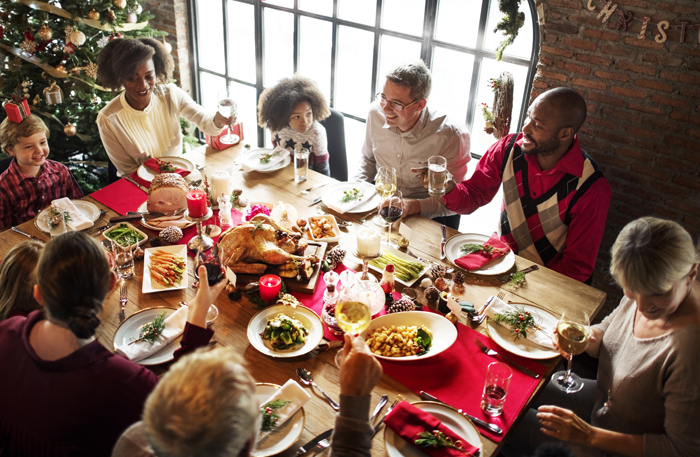This website uses cookies so that we can provide you with the best user experience possible. Cookie information is stored in your browser and performs functions such as recognising you when you return to our website and helping our team to understand which sections of the website you find most interesting and useful.

With just a couple of days to go before Christmas, most people will be ‘breaking up’ from work, to spend quite a few days with family around Christmas time and New Year. Whilst this season is meant to bring feelings of love and cheer, due to the whirlwind of gift-buying, advertising blitzes, family gatherings, parties, children’s demands and activities galore it can end up being extremely stressful!

In fact, according to a poll conducted by ‘Very well mind’, more than 80% of us find the holiday season to be ‘somewhat’ or ‘very’ stressful—that is at a similar level as the stress many of us feel when asking for a pay rise!
At 1000dreams we’re mainly interested in stress, not just as adults, but because of how it can affect the unborn or newly born child – the first 1000 days of life are the most critical when the baby’s brain is developing at a million connections every second! Studies have shown that a stressful environment affects the future of your child. So, if you’re an expectant or new mum and dad, or relatives and friends then this blog is especially relevant.
Here are 6 tips to help manage stress during the holidays:
1. Family time

While this can be a wonderful thing, even the most close-knit families can overdose on togetherness, making it hard for family members to maintain a healthy balance between bonding and alone time. Many families also have roles that each member falls into that have more to do with who individuals used to be rather than who they are today, which can sometimes bring more dread than love to these gatherings. And be aware that people with an introverted nature need space and time alone, which can be challenging if you’re staying with relatives, but having an honest conversation can be helpful in reducing stress. See blog 2 on family stress
2. Set your priorities
Agree with your partner/spouse/family members how you’re going to spend Christmas beforehand so that there aren’t unfulfilled expectations which can cause family rows. You may want to choose a few favourite activities and really enjoy them, while skipping the rest – but be sure to explain to family members what and why you might skip something that you’ve done before.
3. Tolerance – everyone is different
With family and friends, it’s important to be aware of your limitations. Think back to previous years and try to pinpoint how much togetherness you and your family can take before feeling negative stress. A YouGov poll also showed that 37% of adults say that longstanding family tensions are most likely to cause Christmas arguments! “Leaving painful things unmentioned is unhelpful, especially for children and teens” according to the text helpline Shout.
What is your level of tolerance? Can you limit the number of parties you attend or throw or the time you spend at each? Can you limit your time with family to a smaller timeframe that will still feel special and joyful, without draining you?
Also, when dealing with difficult relatives, it can be ok to set limits on what you are and are not willing to do, including possibly forgoing your visits or limiting them to every other year. See blog 3 on ‘relative stress’.
4. Eat, drink & be merry?
Of course Christmas is a time of celebration. However, sometimes there can be such a mad rush to get last minute gifts that we overspend. The temptation to overindulge in spending, rich desserts or alcohol can cause many people the lasting stress of dealing with the consequences (debt, weight gain, memories of embarrassing behaviour?) that can linger long after the season is over. Also, in these more difficult financial times, finding affordable gifts can be stressful in itself, and carrying holiday debt is a tradition that too many people unwittingly bring on themselves, and the stress that comes with it can last for months. So if you’ve already overspent, think very carefully about not spending even more just to get that last minute gift!
5. Loneliness and grief
In many family gatherings at Christmas it can be a difficult time for one or more people. We routinely say, Merry Christmas! Happy New Year! But if you’re somebody who’s going through grief over the loss of a loved one, that can just feel like such a burden. Maybe even an impossibility. Like, ‘why is everybody telling me to be happy when I am not happy, when I have a great deal of sadness’? We are tempted not to mention difficult subjects like grief and loneliness at Christmas but studies suggest that most people dealing with grief after the loss of a loved one, want that person to at least be mentioned in family gatherings. But we are all different, and it may be wise to ask someone who’s grieving just how they want the issue to be dealt with compassionately in your family gatherings. Similarly, loneliness has been said to have reached epidemic proportions in the UK, with one on four of us suffering, and has been called Britain’s most lethal condition! So perhaps consider inviting that family member or friend who you suspect is going to be alone this Christmas.
6. Being present
We often think Christmas is about presents, but perhaps it is more a case of ‘being present’. Many of us spend most of our time thinking about the past – from what happened at work yesterday to what happened years ago – and the future – what am I going to do tomorrow, next year etc. The practice of mindfulness, is about really being present in the moment, without judgement and with self-compassion. So as you’re eating Christmas lunch, try to pause to really enjoy your food and the company around the table and give thanks for all that is good in your life. And if you find that thoughts are buzzing around your head and you’re feeling really anxious then try out the free download below on a calming meditation that may help you.
Finally, the real message of Christmas is one of peace – not just the absence of conflict between people, but the reconciliation between one another (and from a Christian/spiritual perspective with ‘God’). If you’re not at peace during this Christmas holiday, and struggling, then do contact our counselling services.

 If your feeling stressed out over the Christmas holiday period then do access our
If your feeling stressed out over the Christmas holiday period then do access our 





Comments on Holiday Stress – blog 4